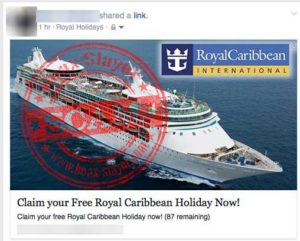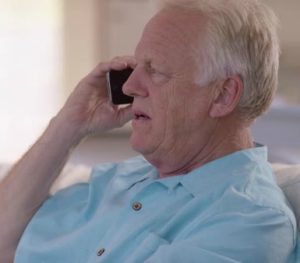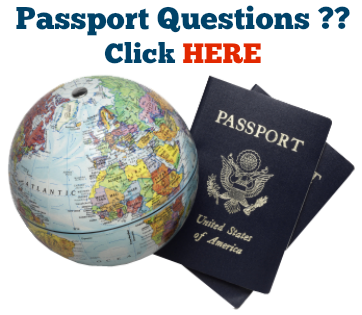
We all want to get the most bang for our buck when we are planning our vacations. To find great deals while we’re traveling, it’s always wise to keep an eye out for potential savings or good deals. Search out unique items when we’re exploring other states, cultures and countries.
One big problem is that scammers know what we’re looking for and they’re waiting and looking for us! They are just hoping that we’ll fall for whatever they’ve cooked up. For a variety of reasons, senior citizens are often the target of these attempted scams. It’s primarily because seniors who are traveling often have the financial resources that criminals are looking to tap into. In addition, seniors are often motivated by a desire to treat family members — especially grandkids — to fun trips and experiences. This makes them an easier emotional target for scammers who are offering family vacations to warm locales or family-friendly destinations such as Disney World.
looking for and they’re waiting and looking for us! They are just hoping that we’ll fall for whatever they’ve cooked up. For a variety of reasons, senior citizens are often the target of these attempted scams. It’s primarily because seniors who are traveling often have the financial resources that criminals are looking to tap into. In addition, seniors are often motivated by a desire to treat family members — especially grandkids — to fun trips and experiences. This makes them an easier emotional target for scammers who are offering family vacations to warm locales or family-friendly destinations such as Disney World.
Here are the most common scams aimed at seniors and some easy tips to help you or someone you love avoid becoming the next victim.
IN THE MAIL
You come home from running errands and grab the mail. In the stack, you see a postcard or “official” looking envelope, declaring that you’ve won a luxurious trip to a “fun and exotic location”.
 Why it might be a scam! Often, these scams use vague language by offering free airfare but give no real concrete information about the trip. Here’s the catch — there will be many fees that you will be required to pay which can often add up to thousands of dollars. In addition, these “free trip” solicitations are often lead-ins to lengthy sales pushes on time-share investments. The American Association of Retired Persons (AARP) highly recommends steering clear of these.
Why it might be a scam! Often, these scams use vague language by offering free airfare but give no real concrete information about the trip. Here’s the catch — there will be many fees that you will be required to pay which can often add up to thousands of dollars. In addition, these “free trip” solicitations are often lead-ins to lengthy sales pushes on time-share investments. The American Association of Retired Persons (AARP) highly recommends steering clear of these.
How to avoid becoming a victim! If something seems too good to be true, it likely is! Jennifer Karchmer, a staff writer for CNNMoney, has said, “Before you pay for any travel package, get all the details, in writing, including the total cost and the refund policy.” If a company isn’t willing to do this, head for the hills and don’t look back!
ONLINE
In this scenario, you receive an intriguing email that invites you to visit a website. On the site page, you’ll be invited to fill out a form. Most likely, it will claim to enter you in a drawing for a chance to win a free vacation. Proposed vacation spots will be popular destinations like Florida, the Caribbean or Mexico.
Why it’s likely to be a scam! Magically, when you fill  out the form, you will then receive an email congratulating you on being a winner and prompting you to call an 800 number. When you call, you will be asked to give your credit card number to “hold your spot” and claim your prize. You will likely never hear from this company again after that phone call!
out the form, you will then receive an email congratulating you on being a winner and prompting you to call an 800 number. When you call, you will be asked to give your credit card number to “hold your spot” and claim your prize. You will likely never hear from this company again after that phone call!
How to avoid becoming a victim! Never, never, never give your credit card information over the phone unless you know the company you are dealing with (like your bank or a company that you make purchases from often).
OVER THE PHONE / TELEMARKETERS
 Your phone rings (usually during dinner) and you are enthusiastically informed that you’ve won a free cruise or trip. Like the promotional postcard or mailer, the language they use will be intriguing but extremely vague. They’ll use words like “luxury, exotic, five-star, once-in-a-lifetime” just to get your attention. The pressure will be strong for you to make a decision, immediately.
Your phone rings (usually during dinner) and you are enthusiastically informed that you’ve won a free cruise or trip. Like the promotional postcard or mailer, the language they use will be intriguing but extremely vague. They’ll use words like “luxury, exotic, five-star, once-in-a-lifetime” just to get your attention. The pressure will be strong for you to make a decision, immediately.
Why it’s surely a scam! Reputable travel agents do not need to use such heavy-handed tactics. They will gladly outline any details you ask for — timing of the trip, any associated fees, allowances, total costs, restrictions and refund policies. They’ll take the time to walk you through everything. They will not ask for credit card info over the phone on a first call.
How to avoid becoming a victim! Above all, listen to your gut. If something seems fishy, pay attention to that and confidently say, “No thank you”. Karchmer’s advice: “Request that your phone number be added to their ‘do not call’ list and get off the phone as quickly as possible.”
The Better Business Bureau (which allows you to check the reputation of any real business) offers these five simple Scam Red Flags:
- Salespersons who use high-pressure tactics, like demanding your credit card number before explaining all the conditions of an offer.
- Postcard or fax promotional mailings that require you to pay a fee or to purchase membership in a travel club, in order to claim a vacation or travel prize.
- Low rates on air travel requiring you to purchase an additional ticket for a companion.
- Offers by companies attempting to subvert U.S. postal authorities by requiring a messenger or courier to deliver the travel package to you in exchange for your payment.
- Companies that require you to wait at least 60 days before taking your trip.
In any of these situations, it is perfectly acceptable for you to flatly refuse and exit the conversation immediately. It’s your money and your time. You get to choose how to spend them wisely. Stick with travel agents and companies whose reputations you trust. You can then make the most out of every trip that you take!








